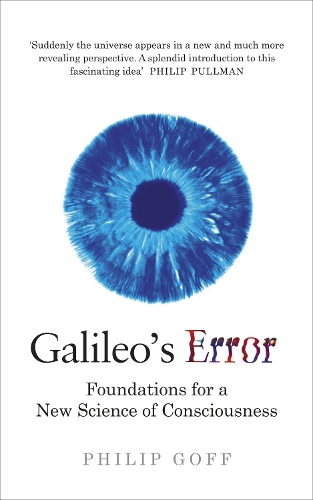
Galileo's Error: Foundations for a New Science of Consciousness
(Paperback)
Publishing Details
Galileo's Error: Foundations for a New Science of Consciousness
By (Author) Philip Goff
Ebury Publishing
Rider & Co
19th November 2019
7th November 2019
United Kingdom
Classifications
General
Non Fiction
128.2
Physical Properties
Paperback
256
Width 135mm, Height 216mm, Spine 19mm
255g
Description
An important manifesto for a new science of consciousness, for readers of Daniel Dennett and David Chalmers 'Suddenly the universe appears in a new and much more revealing perspective. A splendid introduction to this fascinating idea' Philip Pullman From a leading philosopher of mind comes this lucid, provocative argument that offers a radically new picture of human consciousness-panpsychism. Understanding how brains produce consciousness is one of the great scientific challenges of our age. Some philosophers argue that consciousness is something "extra," beyond the physical workings of the brain. Others think that if we persist in our standard scientific methods, our questions about consciousness will eventually be answered. Some even suggest that the mystery is so deep that it will never be solved. Decades have been spent in trying to explain consciousness from within our current scientific paradigm, but little progress has been made. Now, Philip Goff offers an exciting alternative that could pave the way forward. Rooted in an analysis of the philosophical underpinnings of modern science and based on the early 20th century work of Arthur Eddington and Bertrand Russell, Goff makes the case for panpsychism, a theory which posits that consciousness is not confined to biological entities but is a fundamental feature of all physical matter-from subatomic particles to the human brain. In Galileo's Error, he has taken the first step on a new path toward the final theory of human consciousness.
Reviews
This is one of the clearest accounts I've ever read about the mystery of consciousness, and the way in which one theory about it, panpsychism, does a great deal to explain how it occurs and what it is. Why shouldn't consciousness be a normal property of matter, like mass or electrical charge This idea has the glorious simplicity of our first realisation that the earth goes around the sun, and not vice versa. Suddenly the universe appears in a new and much more revealing perspective. Philip Goff's book is altogether a splendid introduction to this fascinating idea.
In Galileos Error, Philip Goff argues for a new approach to the scientific study of consciousness. He offers an accessible and compelling analysis of why our felt experience continues to elude scientific explanation and why the theories that describe consciousness as a fundamental feature of matter have been neglectedand why they now deserve serious consideration. This is a must-read for anyone interested in the future of consciousness studies. -- Annaka Harris, best-selling author of Conscious: A Brief Guide to the Fundamental Mystery of the Mind
Goffs ideas are radical, but his arguments are rigorous and the book is a pleasure to read. I recommend it to anyone who wants to come to grips with mystery of consciousness. -- David Chalmers, New York University
In this provocative, brave and clearly written book, Goff makes a compelling case for an initially absurd thesis. -- Lee Smolin, Perimeter Institute for Theoretical Physics
Galileos Error is wonderful introduction to this ancient set of beliefs and how panpsychism can give rise to a naturalized form of spirituality that can overcome the alienation we all feel in todays globalized world that is beginning to fracture -- Christof Koch, President and chief scientist of the Allen Institute for Brain Science
Author Bio
Philip Goff is a philosopher of mind who teaches at Durham University. He has more than 40 academic publications and is the author of Consciousness and Fundamental Reality. Goff has published numerous articles in newspapers and magazines, such as The Guardian and the Times Literary Supplement, and has guest edited an edition of Philosophy Now magazine. He lives in Durham, England. www.philipgoffphilosophy.com www.conscienceandconsciousness.com Twitter- @Philip_Goff
